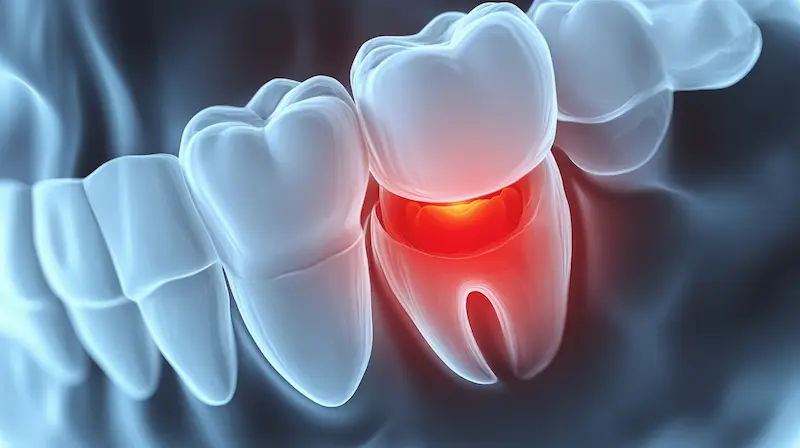The Surprising Connection Between Your Spine and Your Mental Health
Discover the surprising link between spinal health and mental well-being. Learn how posture, nerves, inflammation, and lifestyle choices impact mood, anxiety, and stress.

Written by Dr. Md Yusuf Shareef
Reviewed by Dr. Shaik Abdul Kalam MD (Physician)
Last updated on 13th Jan, 2026

Introduction
We often think of our spine as a simple structural column; something that holds us upright and occasionally aches after a long day. Similarly, mental health is often viewed as residing solely in the brain. But what if the two are intimately linked in ways science is only beginning to understand?
This article explores the surprising connection between spinal health and mental well-being. Back pain is not the only concern; there is a complex biological dialogue happening every second between your vertebrae and your brain. By understanding this connection, you can unlock strategies to improve mood, reduce anxiety, and enhance overall quality of life. We will examine the role of your nervous system, inflammation, stress cycles, and provide practical steps to nurture both a healthy back and a resilient mind.
The Information Superhighway: Your Brain and Spine
Your spine is far more than a stack of bones. It protects your spinal cord, which together with your brain forms the Central Nervous System (CNS), the master control network for your entire body.
1. The Central Nervous System: Your Body's Command Centre
Consider your brain as headquarters and your spinal cord as the main fibre-optic cable running throughout your body. Billions of nerve cells transmit messages at incredible speeds. These govern everything from voluntary movement to involuntary functions such as breathing and heartbeat.
When your spine is misaligned or under stress due to poor posture or injury, it can create interference in this communication network. This is akin to a kink in a hose—the flow of information is disrupted, potentially affecting how your brain perceives and manages emotions.
2. More Than Just Signals: The Spine's Role in Emotional Processing
The CNS is also the primary pathway for sensory information, including pain and emotional stress. The spine helps regulate this flow. Chronic pain signals from the spine can overwhelm the brain, altering neurotransmitters like serotonin and dopamine, which are essential for mood, sleep, and pleasure. Maintaining spinal health ensures that signals to your brain are clear, supporting mental balance and reducing the risk of anxiety or depression.
Consult Top Orthopaedicians
How Spinal Health Directly Influences Your Mind
Several pathways link your back to your brain, notably the vagus nerve and systemic inflammation.
1. The Vagus Nerve: The Mind-Body Bridge
The vagus nerve is the longest cranial nerve, winding from the brainstem through the neck, chest, and abdomen. It is part of the parasympathetic nervous system—your "rest-and-digest" mode. Poor posture, especially "text neck," can compress this nerve, reducing its function. Dysfunction may lead to increased heart rate, anxiety, and poor digestion. A healthy, aligned spine supports optimal vagal tone, which is associated with better mood and stress recovery.
2. Inflammation: The Common Link Between Pain and Mood Disorders
Chronic back pain often triggers low-grade systemic inflammation. Inflammatory cytokines travel through the body and can cross the blood-brain barrier, interfering with neurotransmitter production and function. This inflammation is a recognised contributor to depression. Therefore, spinal inflammation can directly influence mental health, contributing to fatigue, sadness, and brain fog.
3. The Stress-Pain Cycle: A Vicious Loop
Stress causes muscles to tense, especially in the neck, shoulders, and back. This tension leads to pain, which acts as a new stressor, releasing more cortisol and adrenaline. The result is a self-perpetuating cycle of tension and pain. Addressing both physical tension and underlying stress is key. Persistent symptoms beyond two weeks may warrant consulting a doctor online with Apollo24|7 for personalised guidance.
Posture and Psychology: How You Stand Affects How You Feel
Your posture sends signals to your brain, influencing how you feel and behave.
1. The Science of "Power Posing"
Research shows that adopting expansive, open postures for just two minutes can increase testosterone (linked to confidence) and decrease cortisol (stress hormone). Slouching is associated with helplessness and low energy. Improving posture actively signals safety and confidence to your brain.
2. Tech Neck and Its Impact on Anxiety
"Tech Neck" occurs when the head tilts forward while using devices. Each inch forward increases strain on the cervical spine by about 10 pounds. This strain can compress nerves and blood vessels, contributing to headaches, brain fog, and irritability. Physical discomfort and restricted breathing may mimic or exacerbate anxiety.
Mental Health Conditions Linked to Spinal Issues
Spinal problems can worsen mental health, creating a bidirectional relationship.
1. Anxiety and a Tense Spine
Anxiety often causes muscle tension in the upper back, neck, and jaw, producing pain that further fuels worry. This feedback loop makes it difficult to distinguish between anxiety and physical discomfort.
2. Depression and Chronic Pain
Chronic back pain can lead to social isolation and reduced activity, increasing depression risk. Inflammatory responses from persistent pain also alter brain chemistry. Up to 85% of patients with chronic pain experience severe depression. For comprehensive care, a visit with a specialist via Apollo24|7 can help address both physical and emotional aspects.
Actionable Steps to Nurture Your Spine and Mind
Caring for your spine actively supports your mental health.
1. Movement is Medicine: Exercises for a Healthy Back and Brain
Regular exercise such as walking, swimming, or yoga promotes blood flow, releases endorphins, and reduces muscle tension. Core strengthening and posture-correcting moves support the spine and overall mental well-being.
2. Ergonomic Adjustments for Daily Life
Small changes to your daily environment can make a big difference in both spinal health and mental well-being.
• Workstation: Ensure your monitor is at eye level and feet flat on the floor.
• Smartphone Use: Hold your phone at eye level.
• Sleeping: Use a supportive pillow to maintain neutral neck alignment.
3. Mindfulness and Stress-Reduction Techniques
Meditation, deep breathing, and progressive muscle relaxation calm the nervous system. Diaphragmatic breathing stimulates the vagus nerve, promoting relaxation and releasing tension from the back.
Conclusion
The evidence is clear: spinal health and mental well-being are deeply connected. From the central nervous system to inflammation, the links are profound. Recognising this connection allows a holistic approach to wellness. Caring for your back through mindful movement, ergonomics, and stress management is also self-care for your mind. Straightening your posture or taking a stretch break does more than relieve tension; it sends a signal of calm to your brain, fostering resilience and emotional stability. Start small, be consistent, and listen to your body; it may hold the key to a healthier, happier you.
Consult Top Orthopaedicians
Consult Top Orthopaedicians

Dr. Anil Pradeep Jadhav
Orthopaedician
23 Years • MBBS MS (Ortho)
Nashik
Apollo Hospitals Nashik, Nashik
(25+ Patients)

Dr. Rupam Chowdhury
Orthopaedician
10 Years • MBBS, DNB (Ortho.)
Kolkata
MCR SUPER SPECIALITY POLY CLINIC & PATHOLOGY, Kolkata

Dr. Suraj Prakash
Orthopaedician
5 Years • MBBS, MS (Ortho)
Bengaluru
Apollo Clinic, Indiranagar, Bengaluru

Dr. Padam Singh Gautam
General Physician/ Internal Medicine Specialist
43 Years • M.B.B.S (WARDHA M. S.), F.A.G.E. (MANIPAL), F.A.I.M.S. (Pb.), M.A.I.M.S. (Pb.), M.R.S.H. (LONDON)
Noida
Dr Padam Singh Gautam Fracture Clinic, Noida
(250+ Patients)

Prof. Dr. Jambu N
Orthopaedician
23 Years • MBBS, M.S Ortho, FRCS ,FACS
Chennai
Apollo Speciality Hospitals Vanagaram, Chennai
(150+ Patients)
Consult Top Orthopaedicians

Dr. Anil Pradeep Jadhav
Orthopaedician
23 Years • MBBS MS (Ortho)
Nashik
Apollo Hospitals Nashik, Nashik
(25+ Patients)

Dr. Rupam Chowdhury
Orthopaedician
10 Years • MBBS, DNB (Ortho.)
Kolkata
MCR SUPER SPECIALITY POLY CLINIC & PATHOLOGY, Kolkata

Dr. Suraj Prakash
Orthopaedician
5 Years • MBBS, MS (Ortho)
Bengaluru
Apollo Clinic, Indiranagar, Bengaluru

Dr. Padam Singh Gautam
General Physician/ Internal Medicine Specialist
43 Years • M.B.B.S (WARDHA M. S.), F.A.G.E. (MANIPAL), F.A.I.M.S. (Pb.), M.A.I.M.S. (Pb.), M.R.S.H. (LONDON)
Noida
Dr Padam Singh Gautam Fracture Clinic, Noida
(250+ Patients)

Prof. Dr. Jambu N
Orthopaedician
23 Years • MBBS, M.S Ortho, FRCS ,FACS
Chennai
Apollo Speciality Hospitals Vanagaram, Chennai
(150+ Patients)
More articles from General Medical Consultation
Frequently Asked Questions
Q1. Can fixing my posture really help with my anxiety?
Yes. Improving posture reduces strain on the neck and spine, alleviating pressure on nerves like the vagus nerve. This supports a calmer nervous system and complements other anxiety-management techniques.
Q2. I have chronic back pain and feel depressed. Which should I treat first?
It is best to address both simultaneously. Treating pain can lift mood, while addressing depression can support motivation for exercise and therapy. Apollo24|7 offers specialist consultations to coordinate care.
Q3. What is the simplest thing I can do today to help this connection?
Move for five minutes every hour. Neck rolls, shoulder shrugs, and stretching can interrupt tension and stress, providing physical and mental relief.
Q4. Are there specific vitamins or nutrients that support both spine and brain health?
Yes. Omega-3 fatty acids support joint and brain function. Vitamin D is crucial for bone health and may influence mood. Tests like vitamin D or HbA1c are available through Apollo24|7 home collection.
Q5. How does chiropractic care fit into mental wellness?
Chiropractic adjustments improve spinal alignment and nervous system function. By reducing nerve interference and enhancing mobility, patients may experience reduced stress and better sleep, which supports mental health alongside conventional medical care.
_3.webp)



